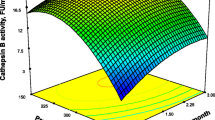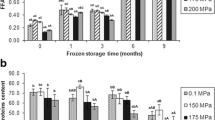Abstract.
The rancidity development during the frozen storage (-20 °C) of an under-utilised medium-fat fish species (horse mackerel; Trachurus trachurus) was investigated. Special attention was given to a pre-freezing treatment consisting of an immersion in NaCl solution (5%, 10%, and 20%) and its effect on lipid damage during the fish frozen storage. Lipid hydrolysis (free fatty acid content) and oxidation (conjugated dienes formation; peroxide value, PV; thiobarbituric acid index, TBA-i; fluorescence formation, FR) were studied up to 270 days of frozen storage. Oxidative rancidity measured by the PV, TBA-i, and FR showed an increase with the frozen storage time and also as a result of an increasing salt content in fish muscle. A high peroxide formation was observed at day 210 of frozen storage, especially in the case of 20% NaCl treated samples. Lipid hydrolysis also increased with the frozen storage time; at the end of the experiment (270 days), a decreasing effect of muscle salt content on lipid hydrolysis was observed. Employment of appropriate antioxidant additions is recommended if salting pre-treatment is to be needed to avoid a large lipid oxidation development and ensure a longer shelf-life time.
Similar content being viewed by others
Author information
Authors and Affiliations
Additional information
Electronic Publication
Rights and permissions
About this article
Cite this article
Aubourg, S.P., Ugliano, M. Effect of brine pre-treatment on lipid stability of frozen horse mackerel (Trachurus trachurus). Eur Food Res Technol 215, 91–95 (2002). https://doi.org/10.1007/s00217-002-0530-1
Received:
Revised:
Issue Date:
DOI: https://doi.org/10.1007/s00217-002-0530-1




